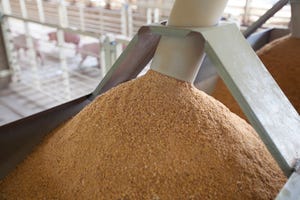Sows are more productive today than ever before. However, continued improvements in sow lifetime productivity will maximize breeding herd profitability and minimize animal welfare concerns
December 23, 2010

Sows are more productive today than ever before. However, continued improvements in sow lifetime productivity will maximize breeding herd profitability and minimize animal welfare concerns.
Length of productive life is moderately heritable and has high variance; thus, substantial genetic variation is expected in most populations. Reproductive failure is the most common reason sows are culled.
Genetic improvement originates with selection in nucleus herds, which is then transmitted through the breeding pyramid in the multiplication process. Therefore, it is critical to identify selection methods that can be applied in nucleus herds that will improve length of productive life in commercial herds.
Sow lifetime productivity is a complex trait believed to be affected by many genes with relatively small to moderate effects. Consequently, the response to traditional selection methods is low; generation intervals will be long, and accuracy of identifying genetically superior, young animals will be reduced. Therefore, application of genomic tools is especially helpful when addressing this trait.
Using genome-wide association studies, we identified several major and minor loci (gene positions on the chromosome) associated with developmental and reproductive traits, as well as with sow lifetime reproductive and productive traits.
As expected, we identified common loci that influence the variation of different traits. For example, some chromosomal regions potentially influence variation of both age at puberty and the number of live piglets produced by a sow in her lifetime.
Researchers are in the process of assembling a panel of DNA markers associated with sow lifetime productivity and identifying procedures to apply the information in whole genome selection. The markers’ effects estimated in this population will be validated in other commercial populations and discussions about potential collaborations were initiated with major breeding organizations and commercial producers. The research is expected to provide a molecular tool that will reduce culling rates and sow death losses, and enhance the productive life of sows.
Researcher: Daniel C. Ciobanu, University of Nebraska-Lincoln. Contact Ciabanu by phone (402) 472-8066 or e-mail [email protected].
You May Also Like



